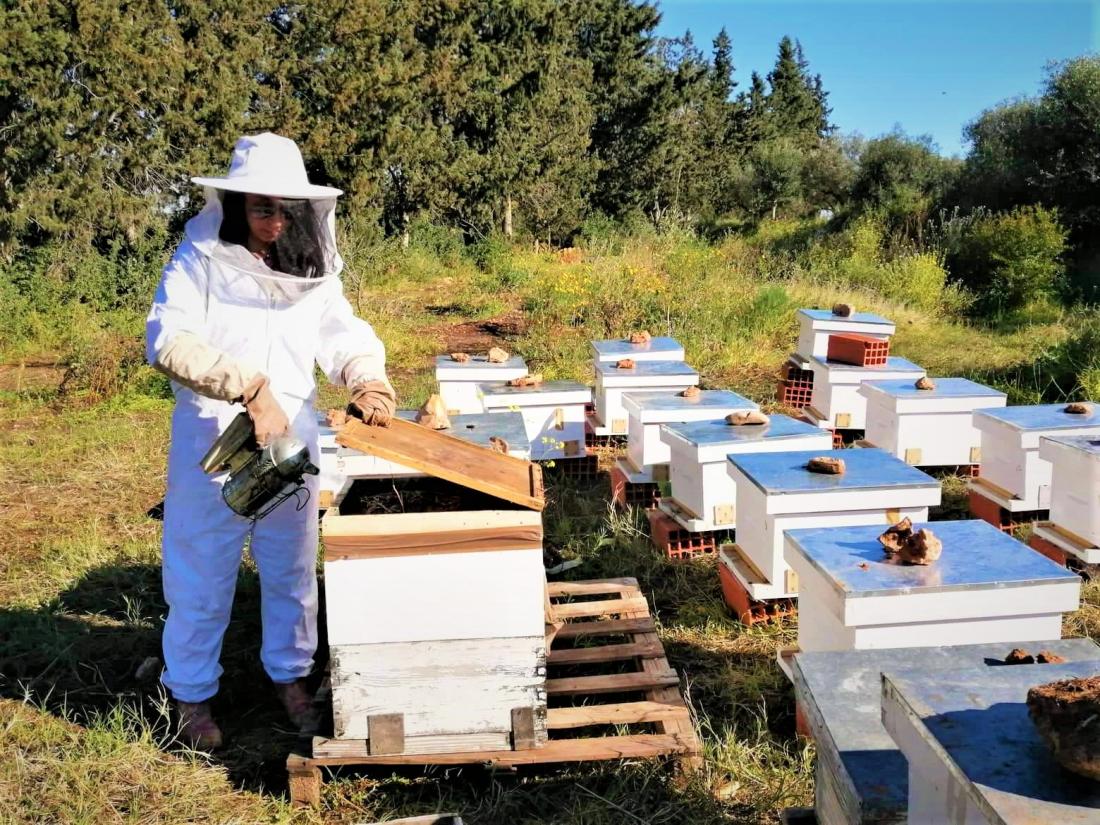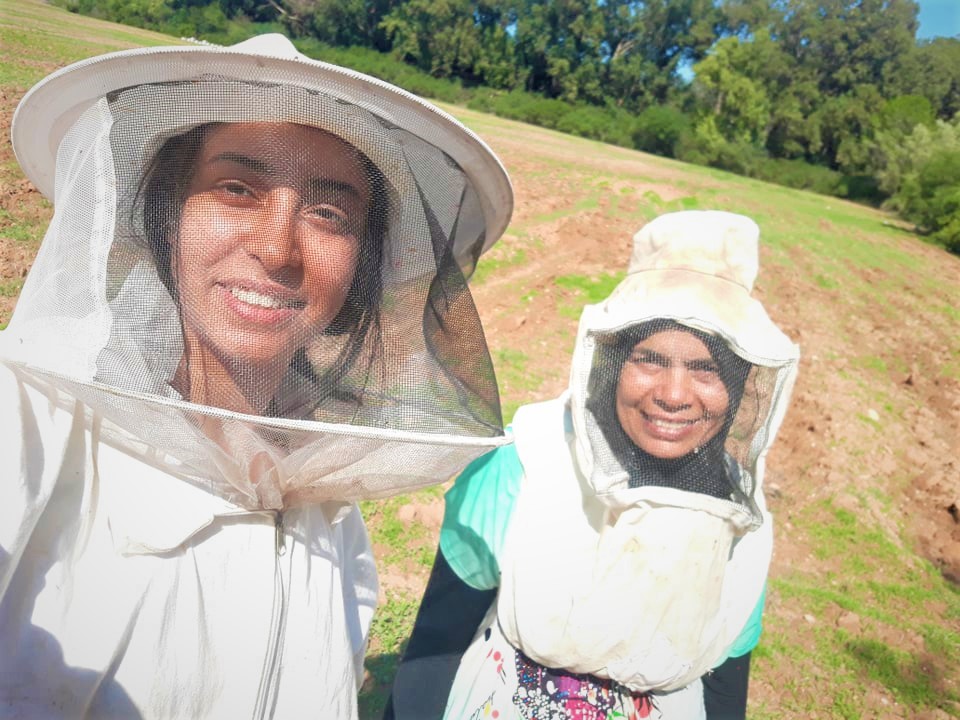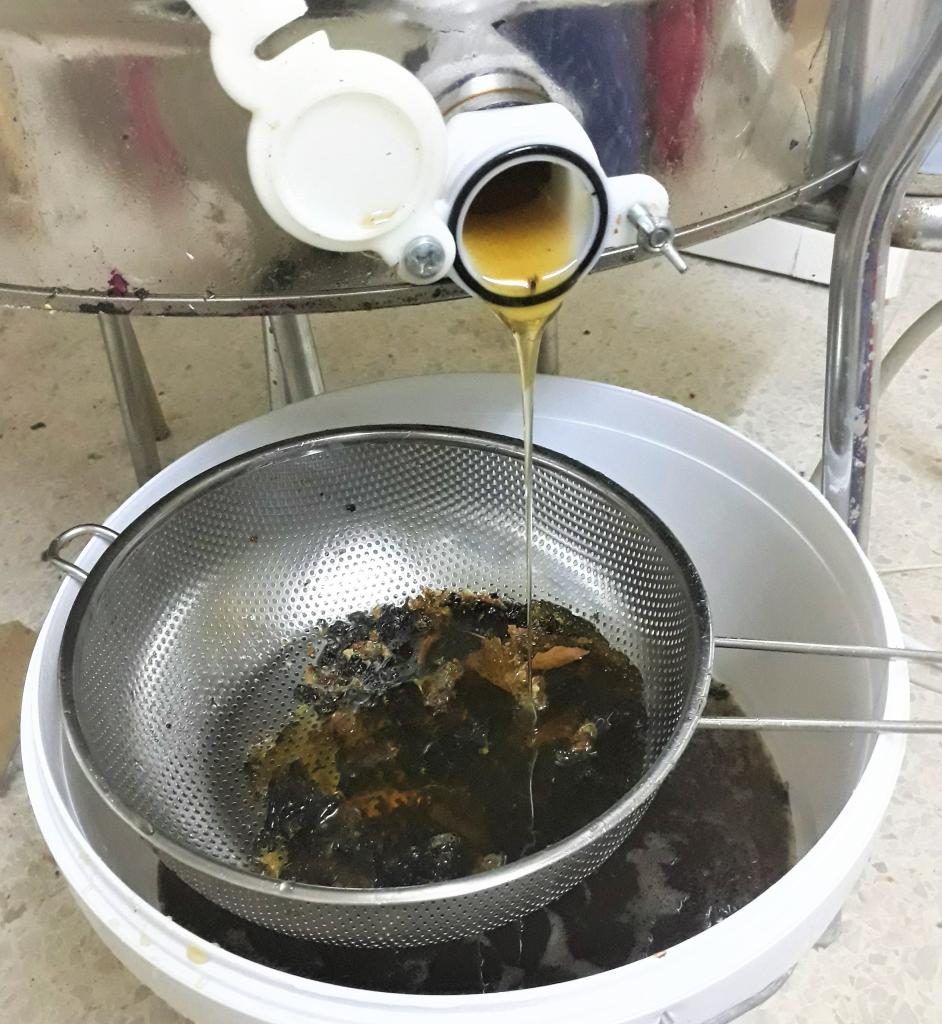[InnovAgroWoMed] Souha Ben Mehrez, apicultrice tunisiennne: "Ce ne fut pas si simple, mais si je devais le refaire, je le referais!"

Contenu disponible uniquement en anglais.
In Tunisia, one of the countries targeted by the InnovAgroWoMed project, the situation of women is paradoxical. The report of the International Labor Organization (ILO-2016) states that "On the one hand, women represent more than two thirds of higher education graduates. On the other hand, the participation rate of women in the workforce is only 26%, compared to 70% for men". This situation is reflected in the indicators of female entrepreneurship. It also points out that "women run few businesses".
During the preparations for the InnovAgroWoMed project's Kick-Off e-meeting, the project's communication team tried to approach these discreet and hard-working women entrepreneurs to get them involved in the project and help them take advantage of the different activities it offers.
Some of these young women agreed to share their experiences with us... the obstacles they had to overcome and the successes they were able to reap in a market in crisis, a sector that is not "appetizing" enough as it is today in the Mediterranean Region, in terms of innovation and growth, and in a society in transition with a heavy socio-cultural heritage.
Souha Ben Mehrez, 26 years old, Tunisian, agronomist engineer specialized in animal production. Ambitious and impatient to start her career, she did not take a break after graduation and immediately applied for jobs in her field. A few months later, her numerous applications were ignored. She realized that the waiting might last much longer.
The employment crisis Vs the female entrepreneurship crisis
In Tunisia, some 10 years after the revolution of January 14, 2011, which was mainly sparked off by the employment crisis, official figures from the National Institute of Statistics (INS) still indicate that the unemployment rate is 15.1%.
Souha did not intend to see her career fail before she began, nor to play the victim of a cruel reality for women. After a few vain job applications, she decided to think bigger and aim higher. Alone against others, she announced to those around her that she was going to realize her dream that had been with her since university, the dream of launching her own project.
"More generally, the entrepreneurial culture is not well rooted in Tunisian families, especially when it comes to women. The social perception of women entrepreneurs is at best suspicious and at worst negative” (ILO - 2016)
Souha still remembers the first reactions of her family and her entourage to her decision which is out of the “ordinary”, especially for a very young graduate woman, who does not have the necessary means to take this step alone.
"If it were another sector of activity, it would perhaps have been less difficult for me to convince those around me, but well, if I had to do it over again, I'd do it again... The beekeeping is what I like the most, and I do not regret anything. We must try, we must impose and prove ourselves and take responsibility!", adds Souha.
She affirms that she has always been "fascinated by the world of animals and agriculture" hence the choice of her university specialty. She wanted to gain experience before embarking on her own project, but the opportunity did not present itself, "I will not stand idly by, I will gain from my failures and my successes". So, she started keeping bees and producing honey.
Women's Empowerment: A Long-Term challenge
Souha tells us that in the beginning "it was not at all easy to convince my parents of my choice. Beekeeping is almost exclusively for men here, as it requires a lot of inter-governmental transportation to diversify the harvest. I had to drive at late hours, my father was worried about me and my safety. Moreover, this sector has always been dominated by male bosses and workers, it takes physical effort and exposes the skin to the risk of stings, it is neither glamorous nor feminine in the eyes of most people. Moreover, since I live in the city, I had to implement this project dozens of kilometers away from my home to be on a compliant farm and with a rent that did not exceed my budget.".
So that, parental approval was essential for a young, freshly graduated girl with no income. Souha adds that "Apart from all these gender stereotypes, my family belongs to the middle class, which generally has no extra reserves to offer to their children. In order to finally agree to help me get started, my father had to set his conditions, including the fact that I must always be accompanied by my uncle, and he also had to manage to lend money for me, so that I could launch the business and buy the equipment, rent the farm, and all the other necessary expenses.... I had to make my own way to succeed, to pay him back, and to gain his trust. It was a huge personal and professional challenge. There was no place for error. I had to succeed or to succeed. ».

Sometime after the launch, the lack of information and the stereotypes continued to grow. The workers on her small farm were not used at all to getting instructions from a female boss. "This attitude of some workers was a bit frustrating and demotivating, but I didn't give up until they became very cooperative and pleasant”.
Over the time, thanks to her perseverance, her presence in the field became "normal", the parents became quite proud of their daughter, the young entrepreneur, and things were getting better. Souha had her production increase slowly but surely, with small means and big passion.

Without a grant or any other type of aid, as well as monthly costs, honey production could not cover all expenses. Souha, who "had no chance for error!", decided to find a second and third job to supplement her income. She worked in telecommunications and transportation. With her engineering degree, she was overqualified for both jobs, but she knew what she was looking for.
The lockdown… a chance to learn:
During the pandemic, Souha could not move around to look after her little bees. She had to stop the activity. The corner shops where she used to sell her honey were all closed. The health crisis didn't help her much to keep her promise of "zero error". Fortunately, she was not alone, and everyone was affected in some way by the crisis.
During this crisis, she saw colleagues in her sphere moving for their farms with specific transport permits. She realized that she had little or no knowledge of the ecosystem and decided to take advantage of the lockdown to take a step back, look for information, find opportunities and come back in force.
Her interview with the InnovAgroWoMed project team took place under these conditions. She wanted to seize the opportunities offered by the project such as training, coaching and support. She needed them. She was among the participants in the project's Kick-off webinar and she shared with the organizers and participants her experience in order to highlight the obstacles and difficulties that young women entrepreneurs may face in the agri-food sector, especially during the pandemic. She also expressed her needs for training and assistance.







